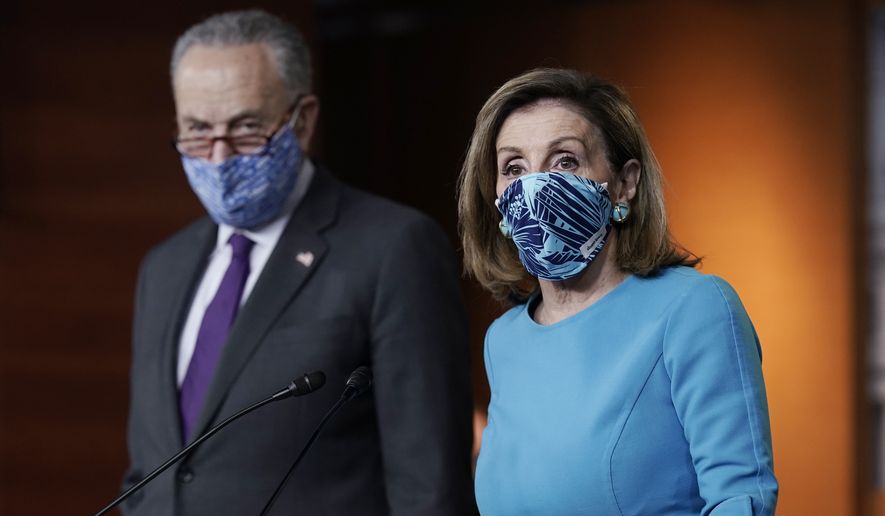House Speaker Nancy Pelosi blew off disappointing election results Thursday, saying it does nothing to undercut her demand for a massive new coronavirus spending bill she says is needed to “crush” the virus.
She and Senate Minority Leader Charles E. Schumer said the growing rate of infections demands a broad response, and they said a $3.4 trillion bill Mrs. Pelosi crafted over the summer is the “starting point.”
“We are at that same place, even more so more so with the pandemic because — look at these numbers,” Mrs. Pelosi said, citing the surging infection and hospitalization rates.
Her stance suggests that last week’s election has done nothing to break the months-long gridlock on another round off coronavirus spending.
Senate Majority Leader Mitch McConnell, the top Republican on Capitol Hill, said Mrs. Pelosi is still shooting too high.
“That’s not a place I think we’re willing to go. But I do think there needs to another package,” he said.
Some analysts had predicted the election would give one side or the other an advantage.
If Republicans had lost control of the Senate and seen their numbers cut in the House, they might have accepted a larger number now — or else Democrats would try again early next year when they would have controlled both chambers.
But the GOP appears on track to keep control of the Senate and Mrs. Pelosi lost ground in the House, though Democrats retain the majority.
Mr. Schumer, though, said Democrats emerged from the election with a stronger mandate because of the result at the presidential level.
“This election was maybe more a referendum on who can handle COVID well than anything else,” the New York Democrat said. “The Donald Trump approach was repudiated. The Joe Biden approach was embraced.”
Congress has already approved more than $4 trillion in COVID-19 relief money over four bills this spring and summer. About $2.4 trillion of that has gone out the door so far, according to the Committee for a Responsible Federal Budget.
House Democrats have approved two other bills, a $3.4 trillion measure and a slightly slimmer $2.2 trillion bill. Senate Republicans, meanwhile, have pursued a $500 billion measure targeted toward business and worker relief.
Mrs. Pelosi had been negotiating with the Trump administration to try to reach a deal before the election, but they were too far apart on the price tag and some key provisions.
And it’s not clear Mr. Trump could have delivered Senate Republicans to that deal anyway.
“We’re not going to do a big big big bill,” said Sen. Richard Shelby, the Republican chairman of the Senate Appropriations Committee.
He’s also shepherding the annual spending process. The government has been running on stopgap funding since Oct. 1, but that money runs out Dec. 11.
Mr. Shelby spoke with Mrs. Pelosi this week about a path forward on those bills, and said the House and Senate agree on about 90% of those issues.
Some lawmakers have suggested attaching a coronavirus bill to the annual spending bills, or at least including emergency money to help distribute a vaccine when one is ready to go.
Sen. Susan M. Collins, Maine Republican, said negotiators seem to have been approaching the coronavirus spending debate “a bit backwards.”
“I think would be best if we assess the need and added it up, as opposed to choosing a number above which we will not go over,” she said.
She said she’d like to see the Senate approve the GOP’s bill then send it to a conference to hammer out differences with Mrs. Pelosi’s legislation.
• Stephen Dinan can be reached at sdinan@washingtontimes.com.




Please read our comment policy before commenting.